Memoirs & Diaries - Ordinary War on the Somme
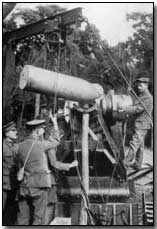 I remember the first
occasion when I was called upon to go over the top. It was during the Somme
"do," where our battalion had already been in some nasty business near the
Briqueterie and Trones Wood.
I remember the first
occasion when I was called upon to go over the top. It was during the Somme
"do," where our battalion had already been in some nasty business near the
Briqueterie and Trones Wood.
I heard about the Third Company's experiences in Trones Wood during my recovery from an overdose of rum, and I was new enough a soldier to feel the strain on my heart-strings when I realized that rum stupor had saved me from participation.
The date was July 27th, 1916. We were bivouacked in a valley near Fricourt, a place of vast mine craters in virgin chalk. I remember clambering about them, trying to stop my imagination from recreating the sensations of the troops who once had occupied trenches there. Lying about were bits of equipment, clothing, bodies. God! imagination was not needed. The thing was reconstructed before my eyes.
I was in this frame of mind when we were told to be prepared to move into the line that night.
I was a signaller. Most old soldiers will know what this implies. Bayonet drill, bombing practice, in short, all those exercises which were supposed to make an efficient soldier, had been carefully and cunningly dodged. I began to regret this. Already I could see myself outclassed by some proficient German in a hand-to-hand encounter.
To be sure, the blade of his bayonet would be saw-cut. Good Lord! what a fool I had been! Or I might be lying in a trench or shell hole, encumbered with rifle, flapper, telephone, and lamp, engaged in an unequal bombing duel with only the stone-throwing skill of my boyhood to help me against a highly trained adversary. I wondered what it might feel like to be wounded - to be killed!
All through that night I never had a wink of sleep. My stomach would insist on rising to my throat to choke me each time I thought of some lurid possibility. And so the night passed and we remained where we were.
In the morning we were told that our affair had been postponed twenty-four hours. Our C.O. kept us from a sleep of exhaustion, which is so easy in the morning, by choosing that time for his heroic lecture to us, in whose hands lay his reputation. How plainly I recollect trying to pierce beneath his brave words and to discover that horrible dread of death which was showing itself in the eyes of almost every one of us.
Slowly but surely that day, the 28th, passed. Last night we thought we were going over the top. Tonight we know. Our C.O. himself has told us so. Back come all the bogies of the previous night. I find myself engaged in calculating the chances of escape. Surely a quarter of our number will remain unscathed. I have one chance in four of coming out none the worse. And the other chances, what are they? Maybe they are three to one against being killed.
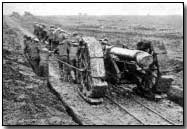 There is some comfort in
that. One chance in four of being wounded, which means a respite, and
one in four of being taken prisoner - almost as good as escaping scot free.
There is some comfort in
that. One chance in four of being wounded, which means a respite, and
one in four of being taken prisoner - almost as good as escaping scot free.
And so I tortured myself all through that second night. At times I would nod off to sleep. "It's all off. It's all off," something would say, and my whirling, maddening thoughts, becoming smoother, less insistent, more incoherent, would creep almost into the arms of sleep... "Fool. Wake up, wake up. It's postponed one hour, two hours, that's all." I jump with a start. The whole mental anguish began all over again.
We did not go up that night; but on the night of the 29th we actually started for the front line. Where we had been lying in bivouac the noise of the guns had been an incessant thunder. We had found time to pity the poor devils who were already in the thick of it. Now we found ourselves approaching the monster. Gradually, as we moved, we were enwrapped in that almost homogeneous sea of sound, and shells burst nearer and nearer.
Stumbling along in the inky darkness, the intensity of which was preserved by frequent explosions, I can hardly attempt to describe my thoughts and feelings. There came a time when two horses dashed madly past us towards the rear. They had been released from their load by a shell which had killed their driver and shattered their wagon. With a crash, one of them collapsed within a yard of us, showing horribly plainly that even horse-flesh cannot be disembowelled and live. We continued going forward.
Then the darkness was temporarily relieved. A dump of Verey lights had been exploded, and a firework display, enough to confuse the most carefully contrived artillery signals, shed a fantastic light upon this hell on earth. Darkness may be awful, but when duty tells you to go and be killed and, in the going, to walk past wounded men, right and left, in the eerie light of military fireworks, the horror of it becomes almost unbearable.
Just before we arrived in our jumping-off trench something happened which I can never forget. A young soldier of my 1 own section was struck by a shell fragment square between the eyes. His cries haunt me now. "Mother of God! Mother of God!" he shrieked time and time again. We left him behind where he lay, whimpering "Mother of God! Good God! I'm blind!" It got in my ears. "Mother of God!" I reiterated, scarcely knowing what I was saying.
 Then I realized the meaning
of the words. In a flash of violent emotion I denied Her there and
then. If She existed, why were we here? She didn't exist.
There was no such thing. My strength was in my three to one odds.
It was all chance. Oh for a Blighty one. Even the fourth chance,
death, was becoming less dreadful. It would take me out of it all,
whatever else might happen... So, at last, we arrived in the front line.
Then I realized the meaning
of the words. In a flash of violent emotion I denied Her there and
then. If She existed, why were we here? She didn't exist.
There was no such thing. My strength was in my three to one odds.
It was all chance. Oh for a Blighty one. Even the fourth chance,
death, was becoming less dreadful. It would take me out of it all,
whatever else might happen... So, at last, we arrived in the front line.
Zero was 7.15 a.m. In a few minutes we should endure the supreme test. Furtive peeps over the parapet revealed nothing of the enemy trenches, for a mist lay over all. What if our artillery had failed to cut "his" wire? Were his machine-gunners waiting to mow us down as we struggled to break a way through his entanglements? The monotonous hammering of these questions must have had different effects on different men.
In me, strangely enough, they induced feelings of utter weariness followed by spasms of fatalistic carelessness, which I could have wished to last the whole war through. But our emotions come and go like clouds in the sky, and my new-found peace of mind was short-lived.
Suddenly the noise of the guns eased off. For a second or two there was quiet. Then the fury of our barrage dropped like a wall of roaring sound before us. By some means the signal to advance was given and understood and we found ourselves walking forward into the mist, feeling utterly naked. Who can express the sensations of men brought up in trench warfare suddenly divested of every scrap of shelter?
Forward we stumbled into a mist that seemed to grow ever thicker. So great was the noise that the order to keep in touch with one another was passed only by means of shouting our hardest, and our voices sounded like flutes in a vast orchestra of fiends.
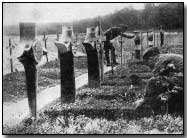 All at once I became
conscious of another sound. A noise like the crisp crackle of twigs
and branches, burning in a bonfire just beyond my vision in the mist, made
me think I must be approaching some burning building. I realized, when
my neighbour on the right dropped with a bullet in the abdomen, that the
noise was machine-gun and rifle-fire, and I felt the tiniest bit happier
when I touched my entrenching tool which, contrary to regulations, was
attached to the front of my equipment instead of the side.
All at once I became
conscious of another sound. A noise like the crisp crackle of twigs
and branches, burning in a bonfire just beyond my vision in the mist, made
me think I must be approaching some burning building. I realized, when
my neighbour on the right dropped with a bullet in the abdomen, that the
noise was machine-gun and rifle-fire, and I felt the tiniest bit happier
when I touched my entrenching tool which, contrary to regulations, was
attached to the front of my equipment instead of the side.
Presently we came to the first enemy trench. How one's thoughts race at such a time! But the surge of apprehension dropped, the steeled muscles relaxed and our hearts ceased their frantic overtime - at least, mine did - when we saw that our artillery had done its work well and truly. We had to pass this trench, but there was no need to jump over it for it was almost filled in - blown in. Maybe the ground over which we walked already buried the enemy we had hoped to slay.
After scrambling over what remained of this trench, I found myself with another signaller, cut off completely from the rest by the mist. We had come close together in our scrambling and remained together. We were alone in a mist which we began to suspect was not altogether made by Nature. Here was a fine mess. Fryer (that was my companion's name) and myself cut off from our comrades, not knowing whither we were going nor how far we should go.
What should we do? We did what irresponsible private soldiers could do - dropped into the nearest shell hole. Discussing our position over a Woodbine, shared by the simple and wasteful expedient of breaking it in two, we went to sleep!
An hour later I was nudged into wakefulness by Fryer. It was considerably quieter, but bullets were still zipping past. The mist had cleared a little and visibility was extended to about 400 or 500 yards. Together we raised our heads, cautiously, above the shell hole, and saw not a soul. Suddenly, from Fryer, "Down! Keep down!" and he suited the action to the word, pulling me with him.
"What the hell are you playing at?" I asked. "Keep down a bit," he said; then, a moment or two later, "Look behind." Carefully I raised my head again and looked. Behind us, in a part of the trench we had crossed that had escaped the general smashing in of high explosives, was a German. A brave man, braver than either Fryer or I, was standing in that bit of trench.
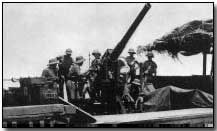 With a rifle to his
shoulder he was firing steadily in the direction of our old front line, and
by his side, keeping under what little cover there was, was another, busily
loading a second rifle. I raised my own to shoot the first active
German enemy I had seen, but Fryer pulled me back. "Don't be a bloody
fool," he said. "Don't you see we're surrounded?"
With a rifle to his
shoulder he was firing steadily in the direction of our old front line, and
by his side, keeping under what little cover there was, was another, busily
loading a second rifle. I raised my own to shoot the first active
German enemy I had seen, but Fryer pulled me back. "Don't be a bloody
fool," he said. "Don't you see we're surrounded?"
I won't worry you with the argument I had with Fryer - nor with myself - about what was our duty. Enough that discretion won and, astonishing though it may seem, we lay down and went to sleep again.
We awoke a second time and fell to discussing plans to get back to our lines. If the worst came to the worst we considered how we might manage to be safely taken prisoners. Once more we carefully peeped over the lip of our shell hole, but the heroes of an hour ago were no longer there. Our inaction was getting on my nerves. I decided to look about me to see what had been happening, but Fryer wouldn't come. He, poor devil, had started to crack up.
Gingerly I climbed out of our friendly shelter. The attack was at that stage when one might walk about almost with impunity. There were too many targets, I suppose, for one more to attract much attention. Besides, everyone was busy, either finding out where he was or digging himself in.
Signal flares were going up half a mile away on our right front and I already began to imagine myself being court-martialled for shirking. What a contrast to my feelings of a short time before when we were "surrounded."
It was with real thankfulness that I found the captain of our company. He was sheltering in a shell hole just as Fryer and I had done. I grew positively superior when he insisted on telling me how his servant had saved his life. In tones as shaken as Fryer's, he described how a tin plate which his servant had put in his haversack had deflected a bullet which otherwise would most certainly have killed him.
I fancied I knew where one Military Medal would go. Then he remembered his men. "Go back," he said to me, "and tell the C.O. that we are absolutely lost; too much damned mist and smoke; and ask for orders. Is there anyone with you? Fryer? Take him with you."
We went back, Fryer and I, reported to the adjutant of one of the battalions of our brigade who was acting brigadier, all his superiors having been killed or wounded, and received instructions to remain in the trench. Messages had already gone out, we were told, ordering a general withdrawal to our starting-point. The attack had failed. Pray God we should not have it to do all over again.
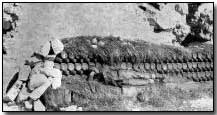 I am sorry I cannot finish
this short account of a " push" with some stirring deed of valour.
Fritz soon became aware of our intention to abandon the attack and it was
not long before his artillery was blowing our trench to pieces. Fryer
was killed at my side. I cannot describe the "incident." I saw
about as much red as was left in the poor chap's face when he settled in a
crouching posture - dead.
I am sorry I cannot finish
this short account of a " push" with some stirring deed of valour.
Fritz soon became aware of our intention to abandon the attack and it was
not long before his artillery was blowing our trench to pieces. Fryer
was killed at my side. I cannot describe the "incident." I saw
about as much red as was left in the poor chap's face when he settled in a
crouching posture - dead.
From that time until we were relieved I waited every second for a similar end. I was buried, and got out. I trembled violently for ten solid minutes with shell-shock, but recovered and had to hang on. When the relief did come it was due more to sheer fatigue than self-control that we refrained from running out of the trenches.
Our whole brigade had suffered very heavy losses. We were taken behind the lines for a rest, addressed by our G.O.C., told how, through lack of information, we had valiantly attacked a force three times our number and, after being brought up to strength, we were sent in to do it again.
Private Fred Ball enlisted in the Liverpool "Pals" in January 1915; crossed to France on November 7th, 1915; served in France continuously during the remainder of the War. Was wounded once - very slightly - near Arras in August or September 1918. After the Armistice went into Germany with the Army of Occupation, leaving there to be demobilized at the end of March 1919. He neither sought nor received promotion.
First published in Everyman at War (1930), edited by C. B. Purdom.
Photographs courtesy of Photos of the Great War website.
"Bellied" was a term used to describe when a tank's underside was caught upon an obstacle such that its tracks were unable to grip the earth.
- Did you know?
